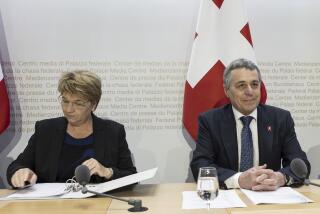Expanding the EU Tent
- Share via
The leaders of the 15 European Union countries, gathering this week in Nice, France, face the herculean task of reshaping the union to accommodate as many as 13 new members. As they ready for Thursday’s meeting they remain divided on virtually every key point, and if they stick to narrow national interests they may well fail to close the gap. The EU heads of states will succeed only if they do not lose sight of the bigger goal: uniting the continent.
Rewriting the EU institutional rules may seem arcane and more important to the bureaucrats in Brussels than to the people in the streets of Berlin. But it will lay the groundwork for bringing many of the Central and East European countries under the EU tent. The newcomers--Poland, the Czech Republic, Hungary, Estonia and Slovenia in the front ranks--look at EU membership as the route to economic prosperity and an end to wars arising from ancient rivalries. To prepare for membership, they carried out wide-ranging economic reforms and rewrote much of their law to conform to the EU model. Those in the first group of applicants hope to become fully fledged members in two to four years. EU institutional reform will take years to implement and must be agreed to now.
Two-thirds of EU decisions are made by a qualified majority vote. But on crucial issues, each country reserves a veto power. Because this system would bring EU decision-making to a halt if more countries were involved, more policy decisions must be majority-based.
One option the EU should consider is to let the member states set their own policies on issues that wouldn’t adversely affect the EU’s overall goals. Uniform taxation, which has divided the EU for years, is a good example. It encroaches on the governments’ basic prerogative to levy taxes, limits their flexibility to adjust taxes to economic conditions and discourages thrift.
The makeup of the EU Commission and a proposal to tie a country’s vote to its population are other issues on the summit’s agenda that will require the governments to make difficult compromises.
A failure at Nice would be a dispiriting blow to the former Eastern bloc countries’ hopes of joining the rest of Europe. More worrisome, a failure would strengthen the hand of the half a dozen countries at the core of the EU that want to forge ahead on their own toward some form of federation. That’s where Europe could start unraveling again.
More to Read
Sign up for Essential California
The most important California stories and recommendations in your inbox every morning.
You may occasionally receive promotional content from the Los Angeles Times.













